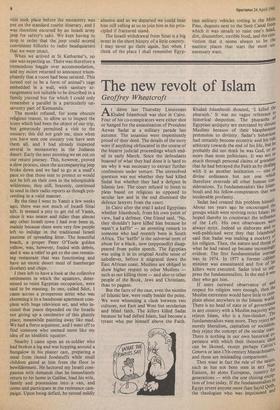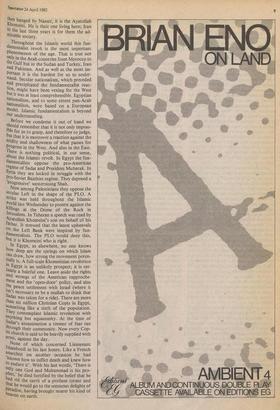The new revolt of Islam
Geoffrey Wheatcroft
At dawn last Thursday Lieutenant Khaled Islambouli was shot in Cairo. Four of his co-conspirators were either shot or hanged for the assassination of President Anwar Sadat at a military parade last autumn. The assassins were impenitently proud of their deed. The details of the story were if anything obfuscated in the course of the bizarre judicial proceedings which end- ed in early March. Since the defendants boasted of what they had done it is hard to see why it was necessary to extract further confessions under torture. The unresolved question was not whether they had killed Sadat but whether they had a defence in Islamic law. The court refused to listen to pleas based on religious as opposed to secular law and in the end dismissed the defence lawyers from the court.
In Cairo after the trial I asked Egyptians whether Islambouli, from his own point of view, had a defence. One friend said, 'No, they shouldn't have killed him because he wasn't a kaffir' — an arresting remark to someone who had recently been in South Africa. The `kaffir' is the universal term of abuse for a black, now (supposedly) disap- peared from polite speech. The Egyptian was using it in its original Arabic sense of unbeliever, before it migrated down the East African coast. Muslims are obliged to show higher respect to other Muslims such as not killing them — and also to other people of the Book, Jews and Christians, than to pagans.
But the facts of the case, even the niceties of Islamic law, were really beside the point. We were witnessing a clash between two cultures, not East and West but secularism and blind faith. The killers killed Sadat because he had defied Islam, had become a tyrant who put himself above the Faith.
Khaled Islambouli shouted, 'I killed the pharaoh.' It was no vague reference W historical despotism. The pharaohs °f Egyptian antiquity are execrated by devout Muslims because of their blasphemous pretension to divinity. Sadat's behaviour had certainly become eccentric and his rule arbitrary towards the end of his life, but be probably did not think he was God, or no more than most politicians. It was not so much through personal claims of grandeur that he had betrayed the Faith as by dealing, with it as another institution — one 0, divine ordinance but not one which therefore overrode all other human eon- siderations. To fundamentalists like Islam' bouli and his fellow-conspirators that was intolerable profanity. Sadat had created this problem himself' About ten years ago he encouraged the groups which were reviving strict Islam. Re hoped thereby to counteract the influence of the Left. His own observances were always strict. Indeed so elaborate and s°, well-publicised were they that Islamboul, said that Sadat was making a mockery his religion. Then, the nature and threat 0' what he had raised up became increasing evident. The first fundamentalist outrage was in 1974. In 1977 a former cabinet minister was assassinated and five of his killers were executed. Sadat tried to stir press the fundamentalists. In the end it was they who got him. If mere outward observance of and respect for religion were enough, then the Muslim extremists would have little to corn` plain about anywhere in the Islamic worldi There is no head of state or of governinen in any country with a Muslim majority Who rejects Islam, who is a free-thinker. Thet fundamentalists want more. They reject no merely liberalism, capitalism or socialism' they reject the concept of the secular stare' There is nothing in our own historical W, perience with which their theocratic idea', can be likened, except perhaps Calvin ,5 Geneva or late-17th-century Massachusetts, and those are misleading comparisons. They want in fact the rule of the saints; such as has not been seen in any Ne? Eastern, let alone European, country for generations — with the one shining excer tion of Iran today. If the fundamentalists in Egypt revere anyone more than Sayid (20t °A the theologian who was imprisoned an
then hanged by Nasser, it is the Ayatollah Khomeini. He is their one living hero; Iran in the last three years is for them the ad- mirable society.
Throughout the Islamic world this fun- damentalist revolt is the most important Phenomenon of the age. That is true not Only in the Arab countries from Morocco to the Gulf but in the Sudan and Turkey, Iran and Pakistan. And as well as the most im- portant it is the hardest for us to under- stand. Secular nationalism, which preceded and precipitated the fundamentalist reac- tion, might have been vexing for the West but it was at least comprehensible. Egyptian nationalism, and to some extent pan-Arab nationalism, were based on a European Model. Islamic fundamentalism is beyond our understanding.
Before we condemn it out of hand we should remember that it is not only imposs- ible for us to grasp, and therefore to judge, but that it is moreover a reaction against the aridity and shallowness of what passes for Progress in the West. And also in the East. There is nothing political, in our sense, about the Islamic revolt. In Egypt the fun-
damentalists oppose the pro-American regime of Sadat and President Mubarak. In Syria they are locked in struggle with the pro-Soviet Baathist regime. They deposed a Progressive' westernising Shah.
Now among Palestinians they oppose the secular Left in the shape of the PLO. A strike was held throughout the Islamic World last Wednesday to protest against the killings at the Dome of the Rock in Jerusalem. In Teheran a speech was read by Ayatollah Khomeini's son on behalf of his father. It stressed that the latest upheavals
On the Left Bank were inspired by fun- damentalism. The PLO would deny this, but it is Khomeini who is right. In Egypt, as elsewhere, no one knows how deep are the springs on which Islam
Can draw, how strong the movement poten- tially is. A full-scale Khomeinian revolution to Egypt is an unlikely prospect; it is cer-
tainly a baleful one. Leave aside the rights
and wrongs of the American rapproche- ment and the 'open-door' policy, and also the peace settlement with Israel (where it isn't necessary to be a mullah to think that Sadat was taken for a ride). There are more than six million Christian Copts in Egypt,
something like a sixth of the population. They contemplate Islamic revolution with
anything but equanimity. At the time of Sadat's assassination a tremor of fear ran through their community. Now every Cop- tic church is said to be heavily supplied with arms, against the day.
None of which concerned Lieutenant Islambouli in his last hours. Like a French
anarchist on another occasion he had known how to inflict death and knew how to endure it'. With his last words, `There is only one God and Muhammad is his pro-
Phet,' he died fortified by the belief that he had rid the earth of a profane tyrant and
that he would go to the sensuous delights of Paradise, having brought nearer his kind of heaven on earth.







































 Previous page
Previous page